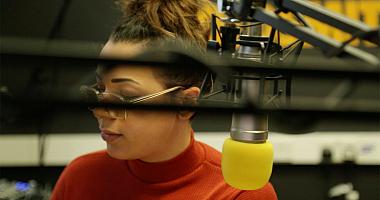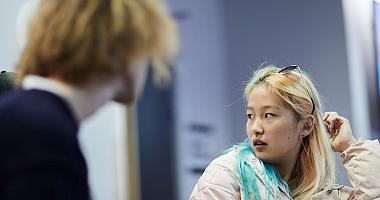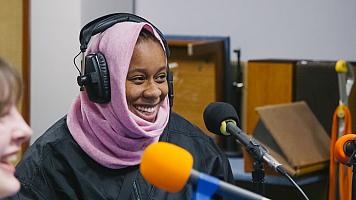MA/MSc Digital Journalism
Content navigation menu
Why study MA/MSc Digital Journalism at Goldsmiths
With an industry-informed curriculum, this future-focused MA combines computing and media and communications to reflect digital journalism at its most current.
- Imagine getting your work recognised by the inventor of the World Wide Web Tim Berners-Lee, having your project featured in the The New York Times, or winning the Guardian’s student digital journalist awards. These are the kinds of things that happen on this dynamic programme.
- Study in one of the top Media, Communications and Cultural Studies departments. We are ranked second in the UK for 'world-leading or internationally excellent' research (Research Excellence Framework, 2021) and 4th in the UK in the 2025 QS World Rankings for Communication & Media Studies.
- Develop a strong set of core digital journalism skills. The programme is evenly split between computing and media and communications, which means you get a holistic MA. You’ll study the foundations of digital journalism and practise it in its most current forms.
- From social media to AI, the questions we ask are informed by an industry panel featuring the heads of digital at organisations including The Guardian, the Financial Times, and the BBC. We want to define the transformative nature of digital journalism, so we explore critical and entrepreneurial approaches.
- You’ll study multimedia, interactive and mobile journalism, data-led investigations and digital reporting. You’ll learn coding and data analysis techniques and produce stories utilising visualisation and web tools.
- You’ll gain specialist skills such as OSINT, verification, generative AI, machine learning, language models and social media analysis.
- We have pioneered the teaching of mobile journalism (MoJo) and the latest investigative techniques in the UK.
- Specialise in your own area of interest in your final project – it could be anything from an interactive website to a multimedia video production. We’ll provide you with the support and digital tools you need to succeed.
- You’ll graduate with core skills in news writing, video and computational techniques as well as some amazing industry contacts.
- Our Journalism degrees offer intensive training in the key practical and contextual skills to create critically aware, thinking journalists for the digital world. You’ll be taught by world-renowned experts and join a cohort of inspiring, like-minded individuals. Find out more about Journalism at Goldsmiths.
Contact the department
If you have specific questions about the degree, contact Miranda McLachlan.
Length
1 year full-time or 2 years part-time
Entry requirements
Undergraduate degree of at least 2:1 standard in a relevant subject. Applicants with significant work experience and/or a qualification in a computing, digital technology or social science-related subject are encouraged. See below for full information on entry requirements
Fees
Home - full-time: £13600
Home - part-time: £6800
International - full-time: £20000
Departments
What you'll study
Overview
The degree consists of modules taught by The Department of Media, Communication and Cultural Studies and the Department of Computing in a truly interdisciplinary and collaborative style.
You will take the following modules:
| Module title | Credits |
|---|---|
| Digital Sandbox | 30 credits |
| Data Journalism and Visualisation | 15 credits |
| Media Law and Ethics | 15 credits |
| Critical Social Media Practices | 15 credits |
| Multimedia News Reporting | 15 credits |
| Introduction to News Reporting | 15 credits |
| Mobile Journalism | 15 credits |
| Major Practical Project | 60 credits |
Assessment
You are required to undertake and pass every element of the programme. Each module is individually assessed using a variety of provisions including digital projects, written work, and exam.
Digital bootcamp
Students without a technical background will be encouraged to take our pre-session Digital Bootcamp in September to gain basic literacy in digital fundamentals, and to get to know fellow students.
We also offer on-to-one consultations before the course begins to ensure that you are well-prepared.
Entry requirements
You should have (or expect to be awarded) an undergraduate degree of at least upper second class standard in a relevant/related subject. Applicants with significant work experience and/or a professional qualification in a computing, digital technology or social science-related subject are encouraged.
You might also be considered for some programmes if you aren’t a graduate or your degree is in an unrelated field, but have relevant experience and can show that you have the ability to work at postgraduate level.
International qualifications
We accept a wide range of international qualifications. Find out more about the qualifications we accept from around the world.
If English isn’t your first language, you will need an IELTS score (or equivalent English language qualification) of 7.0 with a 7.0 in writing and no element lower than 6.5 to study this programme.
If you need assistance with your English language, we offer a range of courses that can help prepare you for postgraduate-level study.
How to apply
Apply directly to Goldsmiths using our online application system
Before submitting your application you’ll need to have:
- Details of your academic qualifications
- The email address of your referee who we can request a reference from, or alternatively a copy of your academic reference
- Copies of your educational transcripts or certificates
- A personal statement – this can either be uploaded as a Word Document or PDF, or completed online. Please see our guidance on writing a postgraduate statement
You'll be able to save your progress at any point and return to your application by logging in using your username/email and password.
When to apply
Applications are open from October, and interviews typically occur from February. Although there is no deadline for applications, we encourage you to apply early.
Find out more about applying.
Fees and funding
Annual tuition fees
These are the PG fees for students starting their programme in the 2025/2026 academic year.
- Home - full-time: £13600
- Home - part-time: £6800
- International - full-time: £20000
If your fees are not listed here, please check our postgraduate fees guidance or contact the Fees Office, who can also advise you about how to pay your fees.
It’s not currently possible for international students to study part-time under a student visa. If you think you might be eligible to study part-time while being on another visa type, please contact our Admissions Team for more information.
If you are looking to pay your fees please see our guide to making a payment.
Funding opportunities
Football Writers Association (FWA) Bursary
The aim of the FWA Bursary is to encourage those students who come from backgrounds that are underrepresented in the industry.
Aziz Foundation Scholarship
Up to nine full fee waiver scholarships are available. The scholarship is open to British Muslims who are Masters offer holders with specific career aspirations, including a career in media or journalism.
Additional costs
In addition to your tuition fees, you'll be responsible for any additional costs associated with your course, such as buying stationery and paying for photocopying. You can find out more about what you need to budget for on our study costs page.
There may also be specific additional costs associated with your programme. This can include things like paying for field trips or specialist materials for your assignments. Please check the programme specification for more information.
Paying your fees
Find out about paying your tuition fees.
If you are a UK student you may be eligible for a postgraduate loan.
Meanwhile our Careers Service can also offer advice on finding work during your studies.
Careers
Our graduates have gone on to work within diverse roles from delivering communications for UNICEF in Bangladesh, to creating content for Rolling Stone magazine in New York.
This programme can help you develop your critical and analytical abilities as well as a great number of practical sought-after skills and competencies. It therefore can lead to many types of career including:
- Digital journalist
- Online editor at large news organisation
- Multimedia reporter
- Community/social media journalist or editor
- Project Manager for journalism projects
- Computational or Data Journalist
- Investigative journalist
- Interactive documentary producer
- Data mining specialist
- Online research methods resource entrepreneur
- Founder of media startup
- Web or Mobile designer
- Data visualisation specialist
- Video journalist
- Photojournalist
Suggested reading
Journalism
- Hicks Wynford and Tim Holmes, (2002) Subediting for Journalists, Routledge
- Kovach, B. & Rosenstiel, T. (2007) The Elements of Journalism. New York: Three Rivers Press
- McKane Anna (2007) News Writing, Sage
- Wolfe, T. (1975) The New Journalism. UK: Picador
- Lee-Wright, Angela Phillips, Tamara Witschge (2011) Changing Journalism, Routledge
- Liebling, A.J. (1961) The Press. Ballentine
- Malcolm, J. (1990) The Journalist and the Murderer. Knopf
- Kelly, J. (1999) Red Kayaks and Hidden Gold: Citizen Journalism Oxford: Reuters Institute for the Study of Journalism
- Phillips Angela (2007) Good Writing for Journalists, Sage
Digital Journalism
- Andre, P., et al, Who Gives a Tweet? Evaluating Microblog Content Value
- Christensen, C. Anthony, S. Roth, E. (2004) Seeing What’s Next: Using the Theories of Innovation to Predict Industry Change; Boston, MA; Harvard Business School Press
- Fenton, Natalie. New Media, Old News: Journalism and Democracy in the Digital Age. Thousand Oaks, CA: Sage, 2010
- Gillmor, D., We the Media; Grassroots Journalism by the People, For the People. Sebastapol, CA., O’Reilly 2004
- Luckie, Mark S. The Digital Journalist's Handbook. Lexington, KY: CreateSpace, 2010
- Negroponte, Nicholas. Being Digital. New York: Alfred A. Knopf, 1995
- Scott, B. (2005) A Contemporary History of Digital Journalism. Television and New Media 6 (1) pp. 89-126
- Shirky, Clay. Here Comes Everybody. New York : Penguin Press, 2008
Computing
- Haverbeke, Marijn (2011) Eloquent JavaScript. No Starch Press
- Janert, Philipp K. (2011) Data Analysis with Open Source Tools. O’Reilly
- Robbins, A. and Beebe, N.H.F. (2005) Classic Shell Scripting, O'Reilly
- Russell, Matthew A. (2011) Mining the Social Web, O'Reilly





